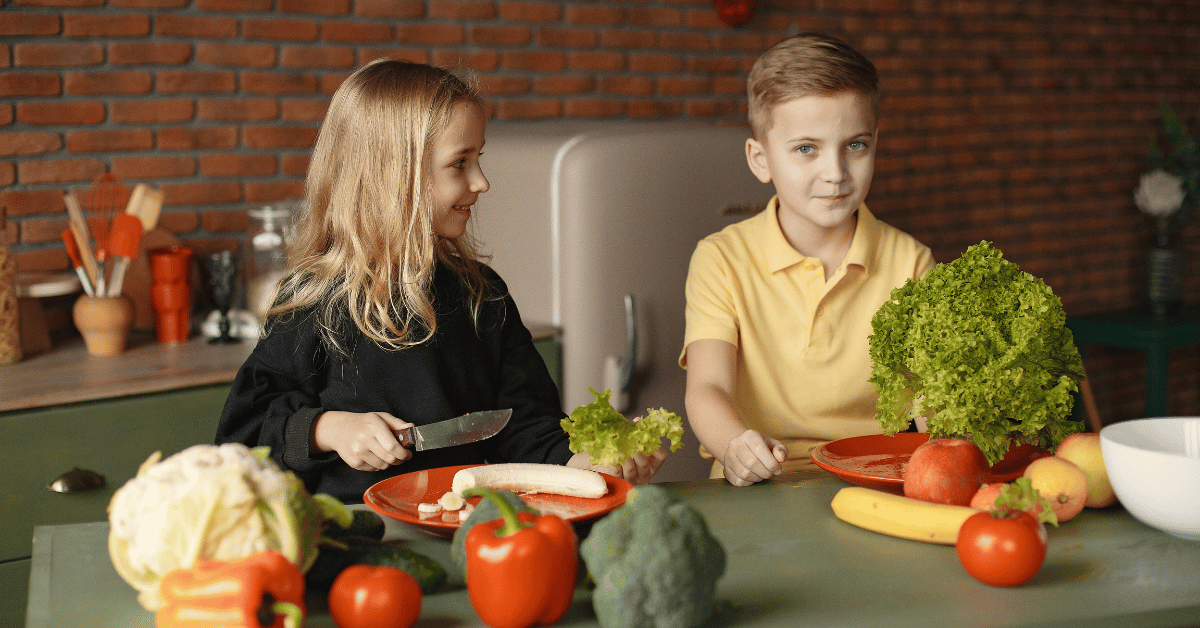Raising Vegan Children in South Africa: A Comprehensive Guide

In recent years, veganism has gained traction in South Africa. More families are embracing this kind of lifestyle.
Veganism excludes all animal products from diet and daily life. It’s not just a dietary choice but a holistic approach to living.
For parents, raising vegan children in South Africa has unique challenges.
But it also offers remarkable benefits.
The Rainbow Nation continues to change. It is also changing its approach to nutrition and ethical living, which has opened up new possibilities. Families can now align their values with their diet.
However, raising vegan children in a country full of diverse food traditions has both chances and obstacles.
They must ensure proper nutrition. They must also navigate social situations. Parents must be well-informed and prepared.
This guide explores raising vegan children in South Africa.
It gives insights. It has practical advice and crucial info for families on this rewarding journey.
Understanding Veganism in the South African Context
Veganism in South Africa has roots that go back decades. But only in recent years has it gained momentum.
The country’s vegan movement began in the 1990s. Small communities formed in cities.
Today, veganism is growing fast. This explosion is especially true in Cape Town, Johannesburg, and Durban.
Rural villages are catching up. Communities are going back to their vegan roots.
Culture is crucial.
It plays a critical role in the adoption of veganism in South Africa.
The nation’s braai culture and meat-heavy dishes are well-known. Choosing a plant-based lifestyle can be viewed as challenging the culture.

However, many South African vegans are finding new ways to veganize traditional dishes. They preserve cultural heritage while aligning with their ethics.
The availability of vegan products and resources has improved dramatically in recent years. Major supermarket chains now sell many plant-based alternatives, from dairy-free milk to meat substitutes.
Specialized vegan stores and online retailers have also emerged. They cater to the growing demand.
Also, vegan restaurants and cafes are becoming more common in cities. This availability makes eating out easier for vegan families.
Despite these advancements, challenges persist. This phenomenon is especially true in rural areas. There, people have limited access to specialized vegan products.
Still, South Africa has many fresh fruits, vegetables, and legumes. They form a strong base for a healthy vegan diet, no matter where you are.
Can you satisfy the proper nutritional needs of your child?
Nutritional Considerations for Vegan Children
Ensuring proper nutrition is crucial when raising vegan children in South Africa.
When a vegan diet is blended, you can meet all nutritional needs. But, parents must pay attention to certain vital nutrients:
Protein Sources
South Africa offers a variety of plant-based protein sources. Beans, lentils, and chickpeas are easily found and are inexpensive legumes. Soy products, including tofu and tempeh, are becoming more accessible in urban areas. Nuts, seeds, and whole grains also contribute to protein intake. Parents should ensure a diverse mix of these foods to provide all essential amino acids.
Vitamin B12
This nutrient is predominant in animal-derived food sources, so vegan children need supplements.
Fortified plant milk, nutritional yeast, and B12 supplements are essential. Regular blood tests can help monitor B12 levels.
Iron and Zinc
Iron is available in plant-based sources such as leafy green vegetables, legumes, and fortified cereals. Combining these with vitamin C-rich foods enhances absorption. For zinc, whole grains, legumes, nuts, and seeds are excellent sources. Soaking and sprouting these foods can increase mineral availability.
Calcium and Vitamin D
Fortified plant milk, leafy greens, and calcium-set tofu provide calcium. Sunlight helps make vitamin D. But you may still need pills, especially in winter.
Balanced meal planning is critical to meeting nutritional needs. Parents should aim for diverse, colourful meals that include:
- A variety of fruits and vegetables
- Whole grains
- Legumes
- Nuts and seeds
- Fortified plant milk and foods
Some nutrients, such as vitamin B12, vitamin D, and omega-3, may require supplements.
It’s best to consult with a dietitian familiar with vegan nutrition. They can ensure optimal growth and development for your child.
Regular check-ups with a paediatrician can help track growth. They can also address any nutritional worries.
With planning and attention to critical nutrients, vegan children in South Africa can thrive and enjoy excellent health.
Here are practical tips that will help you in your journey:
Practical Tips for Raising Vegan Children in South Africa
Raising vegan children in South Africa requires thoughtful planning and preparation. Here are some practical tips to help parents navigate this lifestyle choice:
Meal Preparation and Planning
Batch cook and freeze meals for busy weekdays
Experiment with veganizing traditional South African dishes like bobotie using lentils or soy mince
Invest in a good blender for smoothies and homemade plant-based milks
Use local, seasonal produce to keep costs down and nutrition high
Develop a weekly meal plan to ensure balanced nutrition and variety
School lunches and snacks:
Pack nutrient-dense lunches with whole grains, legumes, fruits, and vegetables.
Prepare homemade snacks like energy balls, fruit leather, or roasted chickpeas.
Provide a thermos for warm meals like soups or stews
Communicate with teachers about your child’s dietary needs
Teach your child about their food choices to help them navigate school situations
Navigating Social Situations and Events
You must offer to bring a vegan dish to share at gatherings
Teach your child to decline non-vegan foods politely
Prepare your child for questions they might face from peers
Research vegan-friendly restaurants for family outings
Consider hosting playdates or parties to showcase delicious vegan options
Educating Family Members and Caregivers
Provide clear guidelines on what your child can and cannot eat
Share resources on vegan nutrition and cooking
Offer to demonstrate easy vegan meal preparation
Be patient and open to questions and concerns
Emphasize the health benefits and ethical reasons for your family’s choice
Using these strategies, parents can support their vegan children and create a supportive environment in South Africa.
Remember to stay flexible and adaptable, as each family’s journey will be unique.
With planning and a good attitude, raising vegan children can be rewarding. It aligns with your values and ensures your child’s health and happiness.
Addressing Common Concerns
Raising vegan children in South Africa brings many concerns. Parents often hear them from family, friends, and doctors.
Here are some common concerns and how to address them:
Protein Intake
Many worry about protein deficiency in vegan diets.
However, a well-planned vegan diet can quickly meet protein requirements.
South African staples like beans, lentils, and chickpeas are protein sources. So are soy products.
It would help if you mixed different plant proteins. Doing this ensures you get all the amino acids you need.
Growth and Development
Many people worry about stunted growth on a vegan diet. But, if you plan the diet correctly, you can dismiss these worries.
Major health organizations support well-planned vegan diets. They endorse them for all life stages, including childhood. Regular paediatric check-ups can help monitor growth and alleviate concerns.
Bone Health
With the absence of dairy, some worry about calcium intake.
Educate others about plant-based calcium sources. These include fortified plant milks, leafy greens, and calcium-set tofu. Emphasize that vitamin D, exercise, and diet help bone health.
Immune System Support
A balanced vegan diet includes many fruits, vegetables, and whole grains. It provides many vitamins and minerals and supports a robust immune system.
Highlight foods that boost the immune system. They include citrus fruits, berries, and leafy greens. These foods are abundant in South Africa.
Addressing these concerns with facts and confidence can ease parents’ worries. It will also reduce the concerns of those around them.
It’s also helpful to share success stories. They should be about thriving vegan children. Also, point to good resources for more information.
Remember, leading by example is the best way. Healthy, happy vegan children are often the best way to ease concerns.
Vegan-Friendly Schools and Education
Veganism is growing in South Africa. More parents seek vegan-friendly schools for their kids.
Here’s how to navigate this aspect of raising vegan children:
Finding Vegan-Friendly Schools
- Research schools that have shown openness to dietary diversity
- Look for places with vegetarian or halal options. They may be more accommodating.
- Consider progressive or alternative schools that may be more aligned with vegan values
- Reach out to local vegan communities for recommendations and experiences
Advocating for Vegan Options in School Cafeterias
- Approach school administration with a well-prepared proposal for vegan meals
- Offer to connect the school with vegan-friendly suppliers or provide recipes
- Collaborate with other vegan or health-conscious parents to show broader support
- Emphasize the health benefits and inclusivity of offering vegan options
Educating Teachers and Staff Veganism
- Schedule meetings with teachers to explain your child’s dietary needs
- Provide informational materials about vegan nutrition for children
- Offer to give a presentation or workshop on veganism to increase understanding
- Parents must avail themselves to answer questions and address concerns throughout the school year
Parents can create a better environment for their vegan children by working with schools and educators.
This proactive approach benefits your child and paves the way for greater acceptance of veganism in South African schools.
The Benefits of a Vegan Diet for Children
You get many health benefits from a well-planned vegan diet. It’s for children in South Africa.
Studies show that plant-based diets can improve health.
They do so in many ways:
Reduced Risk of Density
Vegan diets properties are lower in calories and higher in fibre than standard diets. This combination can help children maintain a healthy weight.
Childhood obesity is rising in South Africa. A balanced vegan diet can prevent it.
Lower Cholesterol Levels
Plant-based diets are naturally cholesterol-free and generally lower in saturated fats. These properties can lead to better heart health from an early age.
Studies have shown that vegan children often have lower total and LDL cholesterol. They have lower levels than their non-vegan peers.
Improved Heart Health
The vegan diet is high in fibre and contains many fruits and vegetables suitable for heart health.
These diets can establish heart-healthy habits that last a lifetime and may reduce heart disease risk in adulthood.
Potential cancer prevention
Plant-based diets contain antioxidants, phytochemicals, and fibre, which are linked to lower cancer risks.
Limited long-term studies exist on vegan children. However, cancer protection in plant-based diets is well-documented.
Additional benefits may include:
- Better digestion due to high fibre intake
- Reduced risk of type 2 diabetes
- Lower rates of allergies and asthma
- Improved skin health
These health benefits come from well-planned vegan diets. They must meet all nutritional needs.
Parents should make sure their children get a balanced diet. They should add supplements when needed.
Regular check-ups with doctors can help monitor the child’s health and growth. They ensure the child is getting all the benefits of their vegan lifestyle.
Are there any vegan resources that can help you?
Vegan Resources in South Africa
Veganism is growing in popularity. South Africa has seen more resources for vegan families.
Here are some valuable options:
Local Vegan Communities and Support Group
- Vegan Society of South Africa: Offers support, events, and information
- Regional Facebook groups: Connect with local vegans for advice and meetups
- Cape Town Vegan Meetup: Regular gatherings for vegans in the Western Cape
Vegan-Friendly Restaurants and Stores
- Wellness Warehouse: National chain with a wide range of vegan products
- Faithful to Nature: Online store offering vegan food, cosmetics, and household items
- Plant Café (Cape Town), Leafy Greens (Johannesburg): Popular vegan eateries
- Local farmers’ markets: Great for fresh, plant-based produce
Online Resources and Forums
- Veganuary South Africa: Website with recipes and tips for new vegans
- SA Vegan Recipes: Instagram page featuring local vegan dishes
- Vegan Kids SA: Facebook group for parents raising vegan children
These resources can provide valuable support.
They have info and community connections. They are for families raising vegan kids in South Africa.
Challenges of Raising Vegan Children in South Africa

Source: Bigstock
Raising vegan children in South Africa can be rewarding. But, it has its own set of challenges:
Limited Food Options in Some Areas
- Rural areas may lack specialized vegan products
- Some schools and childcare facilities may not offer vegan meal options
- Eating out can be challenging in less urban areas
To overcome this:
- Focus on whole foods readily available nationwide
- Prepare meals and snacks in advance when travelling
- Advocate for vegan options in schools and restaurants
Social Pressure and Misconception
- Peer pressure at school or social events
- Misunderstanding from family members or healthcare providers
- Stigma or stereotypes about veganism
Strategies to address these:
- Educate children about their dietary choices and ethics
- Provide clear, science-based information to sceptical families or professionals
- Connect with other vegan families for support and shared experiences
Balancing Cultural Traditions with Vegan Values
- Many South African traditions involve non-vegan foods
- Family gatherings and cultural events may centre around meat-based dishes
To navigate this:
- Create vegan versions of traditional dishes
- Explain the importance of your choices to family members
- Focus on aspects of cultural celebrations beyond food
Admitting and preparing for these challenges can help parents navigate the complexities of raising vegan children in South Africa.
Remember, each challenge overcome strengthens your family’s commitment and educates those around you.
Frequently Asked Questions
A. Is it safe for children to be vegan?
Indeed, a well-planned vegan diet is safe and can meet all nutritional needs for children.
Major health organizations, such as the Academy of Nutrition and Dietetics, say that well-planned vegan diets are suitable for all ages, including childhood.
B. How do vegan children get enough protein?
Vegan children can get enough protein from plants, including legumes, nuts, seeds, whole grains, and soy.
Eat a variety of protein sources. Do this throughout the day. It will ensure you get all the essential amino acids.
C. Can vegan children get all the necessary nutrients?
Proper planning and a balanced vegan diet can provide all the needed nutrients. The diet lacks only vitamin B12, which plant-based eaters can supplement. Parents should pay attention to iron, calcium, zinc, and omega-3 fatty acids.
D. What are the best vegan protein sources for children in South Africa?
Great vegan protein sources are easy to find in South Africa. They include beans, lentils, chickpeas, soy products (like tofu and tempeh), nuts, seeds, and whole grains.
E. How can I ensure my vegan child gets enough calcium?
You can get calcium from fortified plant milks. Also, from leafy green vegetables (like kale and broccoli).
Also, calcium-set tofu and sesame seeds are good sources of calcium. If necessary, you can include calcium-fortified foods or supplements in your diet.
Remember to ask a dietitian or paediatrician for personalized advice. They can help with meeting your child’s nutritional needs.
Conclusion
Raising vegan children in South Africa is a journey. It is full of challenges and rewards.
We’ve explored this throughout this guide.
With planning, education, and support, you can raise vegan children. They can be healthy and happy in the Rainbow Nation.
Parents can confidently embrace this kind of lifestyle. They can do so by understanding the needs of growing children. They should address common concerns and navigate social and cultural challenges.
More vegan resources, products, and communities are growing in South Africa. They further support this choice.
Remember, every family’s journey is unique. Stay informed, remain flexible, and continue to advocate for your children’s needs.
By doing so, you’re nurturing your children. You’re also building a better future for South Africa.
